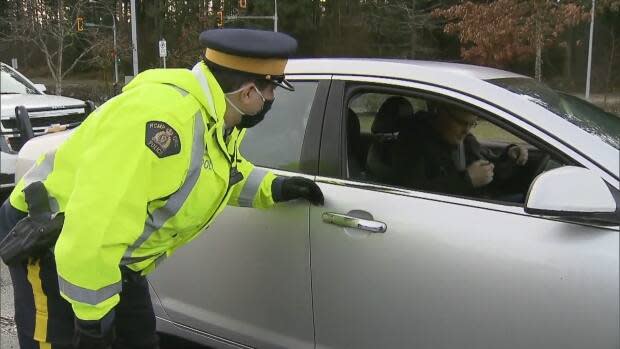Civil liberties group worried BIPOC residents will be unfairly targeted in policing of travel restrictions

The B.C. Civil Liberties Association is concerned about the negative impact an order restricting travel within the province could have on people who are BIPOC residents (Black, Indigenous or people of colour).
On Monday, Premier John Horgan announced new restrictions that will be in place until May 24 to help curtail the spread of COVID-19. Public Safety Minister Mike Farnworth will issue an order Friday under the Emergency Program Act that will restrict a person's ability to leave their health-care authority region, Horgan said.
The order will be enforced through a roadside checkpoint program, which is especially concerning to BCCLA executive director Harsha Walia.
She said data collected over the past 10 years from municipal police forces across the province shows Black and Indigenous people are more likely to be stopped and questioned by police.
"There are measures that need to be taken, but expanded police powers is just not one of them," said Walia on CBC's The Early Edition on Tuesday.
In Ontario, the provincial government amended similar regulations Saturday after several police services indicated they didn't want to take on the responsibility, while the Canadian Civil Liberties Association issued a statement saying it was preparing to go to court over the issue in the coming days.
Police in Ontario will now only be stopping vehicles or people if they are suspected of participating in an organized public event or social gathering, as opposed to random audits.
Hamish Telford, a political science professor at the University of the Fraser Valley, said B.C.'s new restrictions raise all sorts of questions about the constitutionality of what they're trying to do.
"Governments can limit our rights when they are addressing serious pressing and substantial problems and the pandemic certainly qualifies," Telford said. "But we have to ensure that the law is also proportionate to its end. Is there a rational connection to what they are trying to accomplish? And there, I'm not entirely sure."
Horgan said the B.C. system will operate in a similar way to impaired-driving checkpoints conducted during the Christmas season.
"There will be a fine if you are travelling outside of your area without a legitimate reason," Horgan said, although he did not provide details on how much the fine would be.
Walia told CBC she is not convinced using the health regions as travel boundaries makes the most sense in B.C. In some areas, like Vancouver Coastal Health, this will restrict movement between neighbouring municipalities like Vancouver and Burnaby while allowing for "really distant travel" in other health regions, she said.

"The devil is in the details," said Walia, who also wonders if police will be checking travellers on public and private transit or only in vehicles, and what information they will be asking people to provide.
"Even if it's not a random stop … it's also the process by which police will ascertain who will be fined and what will be required to avoid a fine," she said.
Telford echoed these concerns, saying without clear details, there could be a heavier reliance on police discretion which could be problematic.
"We're all at the end of our tethers here, and when measures like this are announced without a full set of details, people get fed up," he said.
"It would have been helpful to think it through properly and announce everything at the same time so people can get a clear picture."
Government says consultations planned
The government said it will be consulting with the BIPOC community to make sure the restrictions do not give anyone fear of additional repercussions.
"It is not our objective to go into some sort of state where we are watching and monitoring everybody's activity," said Horgan on Monday.
In addition to restricted movement between health regions, the province is also erecting signs along the B.C.-Alberta border, reminding people to stay within their own province if travel isn't essential.
BC Ferries will also stop accepting bookings for recreational vehicles such as campers and trailers at the end of this week. The ferry service will be contacting passengers who have already made reservations to ensure they are essential travellers. It will not be implementing any extra sailings this year for the May long weekend.
LISTEN | Harsha Walia discusses concerns about incoming B.C. travel restrictions:

 Yahoo Movies
Yahoo Movies 